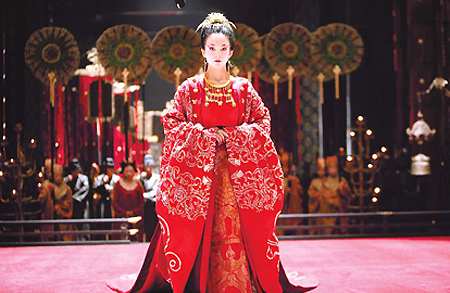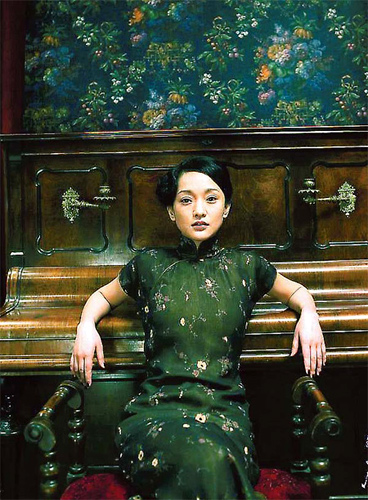Society
Cinema paradiso:what happens when nostalgia meets reality
By Qin Zhongwei and Han Bingbin (China Daily)
Updated: 2010-09-12 09:47
 |
Large Medium Small |
 |
|
Zhang Ziyi took the lead in The Banquet (above), but her career was launched by Director Zhang Yimou, who first cast her as an innocent but determined village girl in The Road Home. |
And so, actresses no longer serve as inaccessible image icons fuelling the fantasies of moviegoers.
They are now flesh-and-blood celebrities who build fame on personality as much as acting ability. Their private lives commandeer the headlines of the penny press as much as any Hollywood superstar.
With such a galaxy of stellar talent to pick from, why then are some directors lamenting the loss of innocence? Why is it so hard to find? According to Jiang Xiaoyu, it all boils down to a very practical reason. The talent pool is getting clichd.
"Students from grassroots families across China are finding it harder to gain admission into major performing and arts colleges due to stringent recruitment procedures and escalating costs.
"This means those who can afford admission are mainly from the big cities or affluent families. They are urban children and they do not have the rustic innocence of the countryside that directors are looking for. Nor do they have the memories of suffering under the 'cultural revolution'(1966-76) or the times of hardship and famine," Jiang says.
 |
|
Zhou Xun is one of the most accomplished talents in Chinese cinema today. Provided to China Daily |
They have to pay a lot more attention to their physical appearances than their elders in the industry ever had to.
Li Yinhe, well-known sociologist and feminist, says the concept of beauty in China is already redefined.
In the '50s and '60s, big breasts were not flaunted but hidden. Many women were shy about their assets and would hang their heads and hunch to avoid accusations of immodesty.
These days, sex sells. It is the new yardstick by which women are measured, and the new maxim is: If you have it, flaunt it.
"Actresses are no longer afraid to use their sexuality in front of the camera. They are proud of their sexiness," Li added.
These changing mores also affect the image of the Chinese actress abroad.
In 1999, when Zhang Ziyi appeared at the Berlin Film Festival dressed in a Chinese dudou (a backless embroidered apron traditionally worn as underwear), she created a stir on the red carpet with her paradoxical wide-eyed innocence and Lolita sex appeal. Last year, when actress Fan Bingbing appeared at Cannes in a dragon-robe-inspired evening gown, she was no longer able to attract the same attention.
Progress is inescapable, so is change. More and more, the faces you see in Chinese productions will reflect the urban evolution right outside the cinema doors. This kaleidoscope of changes, too, will encourage and inspire a new generation of directors and actors - all of whom will help China project its new faces and phases to the curious West.
The next genre of Chinese cinema, predicts Jiang Xiaoyu, will shift its focus from pastoral settings to urban landscapes populated by the upwardly mobile and struggling migrant workers. It is an intricate tapestry of stories waiting to be told.
And in these stories, the new faces of Chinese cinema will find the space and potential to fully exploit their talent in characters more like their own. As for Zhang Yimou and directors like him, the challenge is to find new scripts, and new muses.